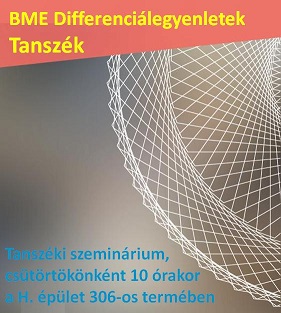
We kindly invite you to the Miklós Farkas Seminar
26 September (Thursday) 10:15, BME, H306
Éva Gyurkovics (BME, Department of Differential Equations)
Stability and stabilization with applications
In this talk, a short survey will be given about the results of the last three years achieved by several colleagues. Firstly, the stability analysis of continuous- and discrete-time time-delay systems based on a set of Lyapunov–Krasovskii functionals (LKFs) will be discussed. An important task in this problem is the estimation of the derivatives and differences of the LKFs. To this end, new multiple integral and summation inequalities will be presented that involve several famous inequalities known before. It will be shown that the proposed set of sufficient stability conditions given by LMIs can be arranged into a bidirectional hierarchy establishing a rigorous theoretical basis for comparison of conservatism of the investigated methods. Sufficient stability conditions will also be presented for the case of time-varying delays based on a parameterized family of LKFs involving multiple integral terms. Comparisons of several bounding inequalities proposed recently for the estimation of integrals and sums of quadratic functions will be discussed: the equivalences of several known variants of the free matrix based inequalities and their generalized and simplified forms are shown. Then, the relationship between the (simplified) free matrix based inequality and the combination of the Bessel-based inequality with different bounding inequalities affine in the length of the intervals are investigated.
Secondly, the results are applied to the non-fragile exponential synchronization problem of complex dynamical networks with time-varying coupling delays via sampled-data static output-feedback controller involving a constant signal transmission delay.
Finally, an algorithm terminating in finitely many steps will be given to determine the dynamic output feedback control with suboptimal finite-frequency H∞ norm bound. Two case studies will be presented to illustrate the effectiveness of the proposed method.
